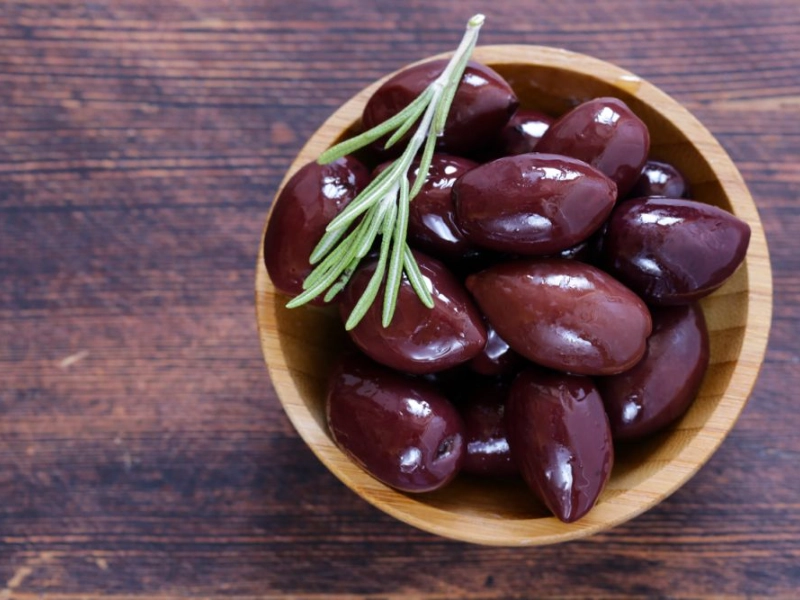Advertisement
2. Chopped Kalamata Olives: A Rich and Flavorful Alternative to Capers

Advertisement
Named for the Greek city of Kalamata, Kalamata olives are a great replacement for capers in many different cooking uses. Mediterranean cooking makes great use of these deep purple, almond-shaped olives because of their meaty texture and rich, fruish taste. Cut kalamata olives offer a special depth and complexity when used as a caper alternative, therefore enhancing the general flavour profile in surprising and pleasing ways.
Perfect combination of brininess, tanginess, and a little fruity sweeteness defines the unique taste of kalamata olives. Many recipes call for capers as a perfect replacement as their taste is quite similar to lemony, briny one. The main distinction is taste intensity; kalamata olives have a stronger, more distinct taste than the delicate quality of capers. In meals where a more strong flavour is needed, their intensity can be a benefit; but, use them sparingly to prevent overwhelming other components.
If kalamata olives haven't been pitted previously, the first step in making them a caper alternative is to pit them. To release the pit, one can manually operate this operation by gently pressing the olive with the flat side of a chef's knife or via an olive pitter. The olives should be finely chopped once pitted to resemble the size and texture of capers. Apart from helping to distribute the taste more fairly over the meal, the cutting technique reduces the olives' texture, therefore facilitating their smooth blending with other components.
Regarding substitution ratios, it is advised usually to substitute capers with chopped kalamata olives 1:1. But given their stronger taste, you might wish to start with a somewhat lesser quantity and change depending on taste. To keep the proper balance of flavours, you might also have to cut the salt recommended for in the original recipe since kalamata olives taste more salted than capers.
In a variety of recipes, chopped kalamata olives are great capers. In salads, where their rich taste and meaty texture can add complexity and interest, they are especially successful. For a classic Greek salad, for instance, chopped kalamata olives can substitute capers while preserving the Mediterranean character of the meal. They also go quite nicely in pasta meals, particularly those with tomato-based sauces or olive oil-based sauces. For dishes like puttanesca sauce or olive tapenade, the strong taste of the olives fits very nicely to herbs, anchovies, and garlic, so they are a great choice.
In main courses, chopped kalamata olives work wonderfully in chicken or fish dishes. They go especially nicely with Mediterranean-inspired dishes with herbs, lemon, and garlic. For a meal like chicken piccata, for example, where capers are normally used, chopped kalamata olives can offer a similar saline bite and their own distinctive taste character. Kalamata olives provide a depth of taste that balances the delicate taste of seafood in fish recipes, including basic baked white fish or more sophisticated seafood stew.
Using chopped kalamata olives as a caper alternative has one visual appeal benefit for a dish. Especially in light-colored meals or those with plenty of green components, their deep purple hue offers a startling contrast. This will improve the meal's whole presentation, therefore increasing its visual appeal and appetising power.
Although kalamata olives are a great caper replacement in many situations, their unique flavour character could somewhat change the taste of your meal. Familiar recipes can get a fresh perspective from the fruity undertones and more strong taste of kalamata olives, maybe resulting in interesting variants on classic cuisine. This presents a chance for culinary innovation since it lets home cooks and chefs play with tastes and give original interpretations of classic recipes.
Ultimately, chopped kalamata olives show to be a flexible and tasty replacement for capers in many kinds of cuisine. Their meaty texture and rich, briny taste make them a great substitute that may usually improve the whole flavour character of a meal. Cut sliced kalamata olives will help you give complexity to a spaghetti sauce, depth to a salad, or a taste of Mediterranean Mediterranean. Thoughtful application and a readiness to explore can help this basic substitute open up new cooking opportunities and maybe result in the development of interesting new flavour combinations.
